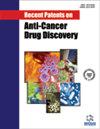基于氧化应激相关基因建立铂耐药卵巢癌患者预后风险模型
IF 4.1
4区 医学
Q3 ONCOLOGY
Recent patents on anti-cancer drug discovery
Pub Date : 2024-05-10
DOI:10.2174/0115748928311077240424065832
引用次数: 0
摘要
简介卵巢癌(OC)是一种异质性恶性肿瘤,治疗效果不佳。氧化应激在产生耐药性方面起着至关重要的作用。然而,氧化应激相关基因(OSRGs)与铂类耐药卵巢癌预后之间的关系仍不清楚。本研究旨在为铂类耐药 OC 患者建立一个基于 OSRGs 的预后风险模型。研究方法通过基因组富集分析(Gene Set Enrichment Analysis,GSEA)确定铂金耐药和敏感OC患者OSRGs的表达差异。采用 Cox 回归分析确定预后性 OSRGs,并建立风险评分模型。该模型通过外部数据集进行了验证。机器学习用于确定与铂类耐药相关的预后OSRGs。最后,通过体外细胞实验确定了所选 OSRG 的生物学功能。研究结果富集了三个与氧化应激相关通路有关的基因集(p <0.05),发现105个OSRGs在铂金耐药和敏感OC之间有差异表达(p <0.05)。发现了20个与预后相关的OSRGs(HR:0:562-5.437;95% CI:0.319-20.148;p <;0.005),并用7个独立的OSRGs构建了一个预后风险评分模型,该模型能准确预测OC患者的生存期(1年、3年和5年的AUC分别为0.69、0.75和0.67)。该模型的预后潜力在验证队列中得到了证实。机器学习显示,五种预后OSRGs(SPHK1、PXDNL、C1QA、WRN和SETX)与OC患者的铂类耐药性密切相关。细胞实验显示,WRN能显著促进OC细胞的恶性程度和铂耐药性。结论基于 OSRGs 的风险评分模型可有效预测 OC 患者的预后和铂类耐药性。该模型可改善临床上对 OC 患者的风险分层。本文章由计算机程序翻译,如有差异,请以英文原文为准。
Development of a Prognostic Risk Model Based on Oxidative StressRelated Genes for Platinum-Resistant Ovarian Cancer Patients
Introduction: Ovarian Cancer (OC) is a heterogeneous malignancy with poor outcomes. Oxidative stress plays a crucial role in developing drug resistance. However, the relationships between Oxidative Stress-related Genes (OSRGs) and the prognosis of platinum-resistant OC remain unclear. This study aimed to develop an OSRGs-based prognostic risk model for platinum-resistant OC patients. Methods: Gene Set Enrichment Analysis (GSEA) was performed to determine the expression difference of OSRGs between platinum-resistant and -sensitive OC patients. Cox regression analyses were used to identify the prognostic OSRGs and establish a risk score model. The model was validated by using an external dataset. Machine learning was used to determine the prognostic OSRGs associated with platinum resistance. Finally, the biological functions of selected OSRG were determined via in vitro cellular experiments. Results: Three gene sets associated with oxidative stress-related pathways were enriched (p < 0.05), and 105 OSRGs were found to be differentially expressed between platinum-resistant and - sensitive OC (p < 0.05). Twenty prognosis-associated OSRGs were identified (HR: 0:562-5.437; 95% CI: 0.319-20.148; p < 0.005), and seven independent OSRGs were used to construct a prognostic risk score model, which accurately predicted the survival of OC patients (1-, 3-, and 5-year AUC=0.69, 0.75, and 0.67, respectively). The prognostic potential of this model was confirmed in the validation cohort. Machine learning showed five prognostic OSRGs (SPHK1, PXDNL, C1QA, WRN, and SETX) to be strongly correlated with platinum resistance in OC patients. Cellular experiments showed that WRN significantly promoted the malignancy and platinum resistance of OC cells. Conclusion: The OSRGs-based risk score model can efficiently predict the prognosis and platinum resistance of OC patients. This model may improve the risk stratification of OC patients in the clinic.
求助全文
通过发布文献求助,成功后即可免费获取论文全文。
去求助
来源期刊
CiteScore
4.50
自引率
7.10%
发文量
55
审稿时长
3 months
期刊介绍:
Aims & Scope
Recent Patents on Anti-Cancer Drug Discovery publishes review and research articles that reflect or deal with studies in relation to a patent, application of reported patents in a study, discussion of comparison of results regarding application of a given patent, etc., and also guest edited thematic issues on recent patents in the field of anti-cancer drug discovery e.g. on novel bioactive compounds, analogs, targets & predictive biomarkers & drug efficacy biomarkers. The journal also publishes book reviews of eBooks and books on anti-cancer drug discovery. A selection of important and recent patents on anti-cancer drug discovery is also included in the journal. The journal is essential reading for all researchers involved in anti-cancer drug design and discovery. The journal also covers recent research (where patents have been registered) in fast emerging therapeutic areas/targets & therapeutic agents related to anti-cancer drug discovery.

 求助内容:
求助内容: 应助结果提醒方式:
应助结果提醒方式:


